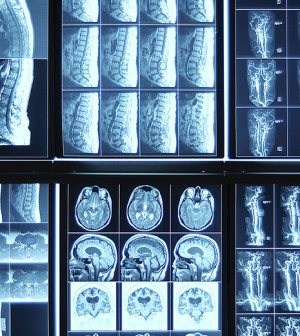- 10 Strategies to Overcome Insomnia
- Could Artificial Sweeteners Be Aging the Brain Faster?
- Techniques for Soothing Your Nervous System
- Does the Water in Your House Smell Funny? Here’s Why
- Can a Daily Dose of Apple Cider Vinegar Actually Aid Weight Loss?
- 6 Health Beverages That Can Actually Spike Your Blood Sugar
- Treatment Options for Social Anxiety Disorder
- Understanding the Connection Between Anxiety and Depression
- How Daily Prunes Can Influence Cholesterol and Inflammation
- When to Take B12 for Better Absorption and Energy
Few Americans Know Warning Signs of Stroke

One in three people can’t list any warning signs of stroke, research from the American Stroke Association shows.
However, the association added that putting common stroke symptoms into the lyrics of a song could help more people recognize when someone is having a stroke. And that could save lives.
In honor of World Stroke Day on Oct. 29, the American Heart Association/American Stroke Association urges people to learn the “F.A.S.T. Song,” to help remember how to spot common signs of a brain attack and what to do if one occurs.
- If someone has a stroke near you, the F.A.S.T. song tells you what to do.
- The letter F stands for face, if one half droops, no time to waste.
- The letter A means an arm that’s weak.
- The letter S means it’s hard to speak.
- The letter T means it’s time to dial 9-1-1. Call right away so help will come.
- Learn the song to show you care, and help end stroke each time you share.
“Most of us can recall using song to memorize something in history class like U.S. states in alphabetical order or the Preamble to the Constitution. It’s fun and it really works. The same principle works for learning stroke signs,” said Dr. Rani Whitfield, an American Stroke Association volunteer.
Stroke is the world’s second-leading cause of death and the number one cause of long-term disability. Strokes require immediate medical attention. The sooner a stroke is identified and treated, the better, the association says.
“Recognizing a stroke right away and calling 9-1-1 is the key when it comes to stroke,” Dr. Jeffrey Saver, director of the Comprehensive Stroke Center at the University of California, Los Angeles, said in a news release from the American Stroke Association.
“We have many effective therapies to treat stroke, but there is a short window for the patient to be evaluated at a hospital and receive treatment like a clot-busting drug or clot-removal device,” Saver stressed.
More information
The American Stroke Association has more on World Stroke Day.
Source: HealthDay
Copyright © 2026 HealthDay. All rights reserved.










